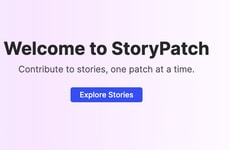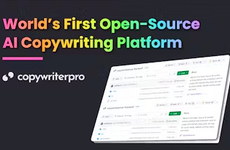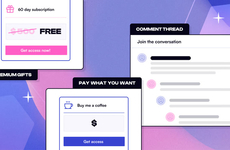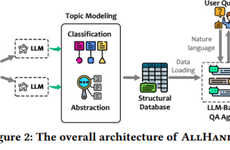
Assignment Zero: an Experiment in Pro-Am Journalism
NEXT by Ramla — June 30, 2007 — Pop Culture
References: zero.newassignment.net & zero.newassignment.net
Assignment Zero is an experiment in professional-amateur journalism: amateurs write/report, professionals edit. Everybody wins. And with this, "pro-am journalism" enters the lingo of the new world of media.
This win-win-win models solves one of the problems related with citizen/crowdsourced journalism: separating the chaff from the wheat. Very simply, to create a check on citizen journalism sources, including blogs, that influence opinion and pass on as "news."
Citizen journalism/ my-blog-is-a-newsroom phenomena have many issues associated with them: everything from spelling & grammar matters, to fact verification, to having coverage diversity has been an open question. There are proposals of self-regulation and external control.
Journalism Professor Jay Rosen, in association with WIRED magazine, has found a pro-active solution somewhat Wikipedia style. Wikipedia is a self-governed content system where the contributors choose the editors - and create patrols such as the "Association of Deletionist Wikipedians."
Here is more from Assignment Zero:
Inspired by the open-source movement, this is an attempt to bring journalists together with people in the public who can help cover a story. It's a collaboration among NewAssignment.Net, Wired, and those who choose to participate.
The investigation takes place in the open, not behind newsroom walls. Participation is voluntary; contributors are welcome from across the Web. The people getting, telling and vetting the story are a mix of professional journalists and members of the public -- also known as citizen journalists. This is a model I describe as "pro-am."
The "ams" are simply people getting together on their own time to contribute to a project in journalism that for their own reasons they support. The "pros" are journalists guiding and editing the story, setting standards, overseeing fact-checking, and publishing a final version.
How it works:
Assignment Zero is a huge, networked global WIRED newsroom where editors (pros) assign stories, articles, interviews to be reported on by individuals or "crowd." WIRED takes up the content aggregated ("packaged") by AZ, and reviews it for publication in WIRED proper. Jeff Howe, contributing editor at WIRED, had this to say about the first package:
"With shockingly few exceptions, the interviews are compelling, thought-provoking and chock full of insights both philosophical and practical. The final package represents, to my knowledge, the most comprehensive and exhaustive knowledge base on the various ways the Internet has given rise to collaborative forms of production."
My Review:
Love the concept. There was a danger of Internet rapidly filling up with the useless, the uninformed, or simply the far-fetched imaginative. With the rising audience that sources such as blogs and citizen journalism sources are attracting, and the speed of the information flow, it was critical that some form of governance is put in place while assuring that the basic purpose of "crowdsourcing" and "interactive web" is not killed.
This is the kind of intervention that assures that we were not, anytime soon, going to throw our hands up in the air and scream, "Yet another trashy news!"
While the model can always adapt and learn, it's system with the ability to grow organically. 4/5 stars!
Limitations:
It's just the assignment desk of WIRED - so far. One wishes that the experiment is fruitful, and extends to other publications. I've been using some blog, esp. tech support related, for help, hacks, and health of my online life. Then there are lifestyle and management "gurus" - who need to replace some of the isolated persons writing in magazines.
Like other things Internet, AZ is starting from the tech-tech world - and it ought to spread itself to the life-tech world.
This win-win-win models solves one of the problems related with citizen/crowdsourced journalism: separating the chaff from the wheat. Very simply, to create a check on citizen journalism sources, including blogs, that influence opinion and pass on as "news."
Citizen journalism/ my-blog-is-a-newsroom phenomena have many issues associated with them: everything from spelling & grammar matters, to fact verification, to having coverage diversity has been an open question. There are proposals of self-regulation and external control.
Journalism Professor Jay Rosen, in association with WIRED magazine, has found a pro-active solution somewhat Wikipedia style. Wikipedia is a self-governed content system where the contributors choose the editors - and create patrols such as the "Association of Deletionist Wikipedians."
Here is more from Assignment Zero:
Inspired by the open-source movement, this is an attempt to bring journalists together with people in the public who can help cover a story. It's a collaboration among NewAssignment.Net, Wired, and those who choose to participate.
The investigation takes place in the open, not behind newsroom walls. Participation is voluntary; contributors are welcome from across the Web. The people getting, telling and vetting the story are a mix of professional journalists and members of the public -- also known as citizen journalists. This is a model I describe as "pro-am."
The "ams" are simply people getting together on their own time to contribute to a project in journalism that for their own reasons they support. The "pros" are journalists guiding and editing the story, setting standards, overseeing fact-checking, and publishing a final version.
How it works:
Assignment Zero is a huge, networked global WIRED newsroom where editors (pros) assign stories, articles, interviews to be reported on by individuals or "crowd." WIRED takes up the content aggregated ("packaged") by AZ, and reviews it for publication in WIRED proper. Jeff Howe, contributing editor at WIRED, had this to say about the first package:
"With shockingly few exceptions, the interviews are compelling, thought-provoking and chock full of insights both philosophical and practical. The final package represents, to my knowledge, the most comprehensive and exhaustive knowledge base on the various ways the Internet has given rise to collaborative forms of production."
My Review:
Love the concept. There was a danger of Internet rapidly filling up with the useless, the uninformed, or simply the far-fetched imaginative. With the rising audience that sources such as blogs and citizen journalism sources are attracting, and the speed of the information flow, it was critical that some form of governance is put in place while assuring that the basic purpose of "crowdsourcing" and "interactive web" is not killed.
This is the kind of intervention that assures that we were not, anytime soon, going to throw our hands up in the air and scream, "Yet another trashy news!"
While the model can always adapt and learn, it's system with the ability to grow organically. 4/5 stars!
Limitations:
It's just the assignment desk of WIRED - so far. One wishes that the experiment is fruitful, and extends to other publications. I've been using some blog, esp. tech support related, for help, hacks, and health of my online life. Then there are lifestyle and management "gurus" - who need to replace some of the isolated persons writing in magazines.
Like other things Internet, AZ is starting from the tech-tech world - and it ought to spread itself to the life-tech world.
Trend Themes
1. Pro-am Journalism - The Assignment Zero model of professional-amateur journalism creates opportunities for collaboration and knowledge sharing between journalists and citizen journalists.
2. Crowdsourcing - Assignment Zero's crowdsourced approach to journalism provides an innovative solution for gathering information and covering stories in a collaborative and inclusive way.
3. Self-regulation in Journalism - The concept of self-regulated journalism, as seen in Assignment Zero's model, allows for quality control and fact-checking in citizen journalism and blogs.
Industry Implications
1. Media and Journalism - The media and journalism industry can adopt the pro-am journalism model to foster collaboration and enhance the accuracy and diversity of news reporting.
2. Technology and News Platforms - Technology companies and news platforms can incorporate crowdsourcing methods, like Assignment Zero, to engage users and encourage citizen journalism participation.
3. Education and Training - The education and training industry can offer courses and workshops to equip aspiring citizen journalists with the necessary skills for fact-checking, reporting, and collaborating with professional journalists.
4.2
Score
Popularity
Activity
Freshness























